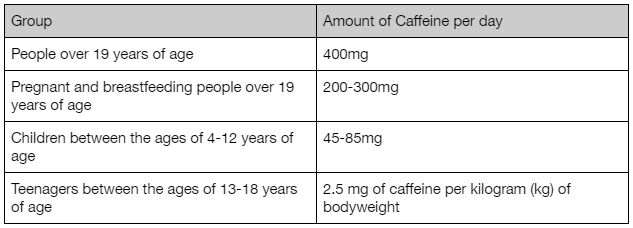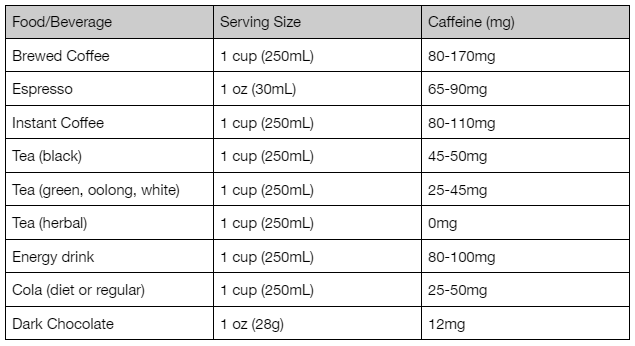
Caffeine has always been a hot topic of discussion. Many of us love to start our day with a nice cup of coffee or tea, or treat ourselves with a generous square of dark chocolate after dinner. Many of us gravitate towards caffeinated beverages to give us a jump start to our day and a warm hug of comfort. But what exactly is caffeine, and what should we think about the next time we go for an afternoon pick-me-up?
What is caffeine?
Caffeine is an ingredient found in coffee and cocoa beans, tea leaves, guarana and yerba maté. Caffeine is a stimulant and diuretic, and is often added to carbonated drinks and cold/headache medications. It is generally absorbed in the body within 45 minutes, and can be present in the bloodstream from anywhere between 1.5 to 9.5 hours until it is metabolized in the liver and removed from the body.1
How much is too much caffeine?
According to Health Canada data, many Canadians consume more than the recommended amount of caffeine.2,3 The following amounts of caffeine are considered the safe upper limit for most people:

However, people have varying tolerances to caffeine. It is important to check in with yourself and your body to see if caffeine may be giving you undesirable effects. Some common signs of too much caffeine are4:
Difficulty sleeping
Nervousness/anxiety
Headaches
Increased heart rate
Feeling jittery
Gastrointestinal discomfort (heartburn, diarrhea)
Health considerations of caffeine
There are many potential health benefits to consuming caffeine, especially in the form of coffee. Many studies have shown that consuming 1-2 cups of coffee a day have been associated with improved liver health, such as a lower risk of developing liver cancer, fibrosis and cirrhosis.5 Research has also suggested the protective effect of consuming coffee on one’s risk of developing gallstones, Parkinson's disease, Alzheimer's, and some forms of cancer.5 Caffeine is even routinely used in asthma medications, as it is used to both relax the smooth muscles of the lungs and open up the air ways to improve breathing. There are also many documented benefits of caffeine intake on athletic and physical performance. Lastly, regular coffee intake has been associated with lower risk of type 2 diabetes.5,6 However, these benefits have been shown in caffeinated and decaffeinated coffee, suggesting there are other coffee plant compounds that may be providing the protective effect.
There are also some potential negative health consequences to high caffeine intake. People who consume more than the recommended amount of caffeine, or often experience the negative side effects above, are found to have poorer sleep quality and increased anxiety levels. For those who are pregnant, consuming more than the recommended amount of caffeine can lead to dangerous health consequences for the baby, including low birth weight. Therefore, it is important to reflect on your caffeine intake and body cues.
Food sources of caffeine*

*Retrieved from Unlock Food Canada and Health Canada
Tips to reduce caffeine intake
If you believe you may be consuming too much caffeine and you would like to decrease your total caffeine intake, try the following suggestions:
For every cup of coffee, drink 2 cups of pure water.
Try mixing regular coffee with decaffeinated coffee.
Limit caffeine to the morning, and rely on decaffeinated teas/coffee after lunch.
Try including herbal teas such as chamomile, ginger, turmeric, and fruit teas.
Avoid energy drinks, as they can contain extremely high levels of caffeine and added sugars.
Have a nice cup of hot lemon water.
Try a nice matcha tea or matcha tea latte.
Have an espresso or single americano. It often has less caffeine than a cup of brewed coffee.
Lastly, make sure you are having well balanced, scheduled meals and snacks, as well as getting a good night of sleep!
Summary
Caffeine is an important part of many people's day. Coffee and tea have a strong cultural, social, and psychological component that must also be considered. There are many potential health benefits of having a cup or two of caffeinated beverages like tea and coffee. However, excessive caffeine can be problematic. In addition, coffee and tea can often be a hidden source of added sugars and saturated fats if you like to add cream and sugar. When enjoying a cup of coffee or tea, take the time to see how it truly makes you feel, and whether you may be overdoing it. Otherwise, brew yourself a nice warm beverage and we will meet you on a nice morning walk.
Take the first step in your journey towards better health
References:
1 Caffeine. The Nutrition Source. (2020, November 12). Retrieved March 15, 2022, from https://www.hsph.harvard.edu/nutritionsource/caffeine/
2 Health Canada. (2012, February 16). Government of Canada. Canada.ca. Retrieved March 15, 2022, from https://www.canada.ca/en/health-canada/services/food-nutrition/food-safety/food-additives/caffeine-foods/foods.html
3 De Santis, A. (2020, March 16). Do we all consume way too much caffeine? Andy The RD. Retrieved March 15, 2022, from https://andytherd.com/2020/03/16/do-we-all-consume-way-too-much-caffeine/
4 Dietitians of Canada. Facts on caffeine. Facts on Caffeine - Unlock Food. Retrieved March 15, 2022, from https://www.unlockfood.ca/en/Articles/Caffeine/Facts-on-Caffeine.aspx
5 De Santis, A. (2021, March 4). Health benefits of caffeine - not just a pick me up. Andy The RD. Retrieved March 15, 2022, from https://andytherd.com/2021/03/04/health-benefits-of-caffeine-not-just-a-pick-me-up/
6 Moderate amounts of coffee are the best. Harvard Health. (2020, November 1). Retrieved March 15, 2022, from https://www.health.harvard.edu/staying-healthy/moderate-amounts-of-coffee-are-the-best
7 Health Canada. (2021, December 29). Canadian nutrient file (CNF) - search by food. Government of Canada. Retrieved March 15, 2022, from https://food-nutrition.canada.ca/cnf-fce/index-eng.jsp
